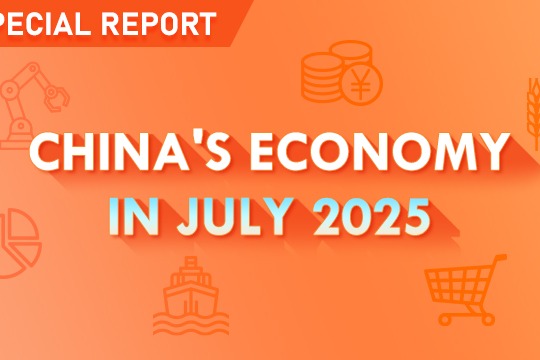PV industry gets ready for next phase
Government moves to curb 'irrational competition' in critical sector

China is moving to further regulate competition within its solar photovoltaic (PV) industry, aiming to accelerate the photovoltaic sector's shift to value-driven growth while fostering a healthier and more sustainable development path for the sector.
In a sign of growing concern over cutthroat pricing and overcapacity, six government bodies, including the Ministry of Industry and Information Technology (MIIT) and the National Energy Administration (NEA), convened a joint symposium of the PV industry on Tuesday, signaling a concerted effort to address what officials termed "irrational competition" within the sector.
The meeting emphasized the critical importance of regulating competitive practices for the high-quality development of the PV industry, urging all stakeholders to work together to promote its healthy and sustainable growth.
It called for strengthening industrial regulation, enhancing investment management for PV projects and promoting the orderly exit of outdated production capacity through market-oriented and rule-of-law approaches.
Liu Qiao, dean of Peking University's Guanghua School of Management, said that the competition will inflict significant harm, driving down corporate investment returns while jeopardizing long-term planning and investment in research and development.
"For China's economy to maintain sustained, healthy, long-term growth, it's crucial for businesses to remain dynamic, characterized by consistently high investment returns," he said.
"The competition undermines this core competitiveness, hindering profitability and ultimately jeopardizing the revitalization of China's economy. A long-term perspective fostering mutually beneficial development that considers the interests of all stakeholders is essential for every enterprise."
Chen Deqiu, vice-president of the University of International Business and Economics, and a professor at the Business School of the university, said the competition is essentially a low-level, repetitive expansion, a vicious cycle fueled by insufficient innovation.
Improving price monitoring and product pricing mechanisms, and cracking down on illegal and irregular activities such as selling below cost and false marketing are equally important, he said.
The competition not only distorts market resource allocation but also hinders the transition of China's industries toward high-quality development, he said.
"It undermines the long-term competitiveness of businesses, threatens the security of our supply chains, and jeopardizes the national industrial upgrading strategy," said Chen.
"To break free from this predicament, we need to establish anti-monopoly enforcement as a baseline and implement targeted industrial policies to guide the market away from low-price, cost-based competition toward value-driven competition. This should be a key focus of our reforms."
The MIIT called for leveraging the role of industry associations to advocate for fair competition and orderly development and strengthening technological innovation leadership to maintain a sound development environment for the industry.
The move comes amid growing concerns that aggressive pricing strategies and rapid capacity expansion are undermining the long-term health of the industry, even as it remains a global leader in solar panel production and deployment.
The government's intervention reflects a desire to move beyond simply chasing volume and toward a more sustainable model that prioritizes innovation, quality and fair competition.
Industry experts believe the emphasis on industry self-regulation also suggests a desire to empower industry associations to play a more active role in setting standards and promoting best practices.
The success of this regulatory push will depend on the willingness of companies to embrace a more collaborative and responsible approach to competition. While some may initially resist the changes, many industry players recognize the need for a more sustainable model that benefits all stakeholders in the long run, they said.
"The focus is shifting from a race to the bottom on price to a more balanced approach that values technological advancement and responsible business practices," said Lin Boqiang, head of the China Institute for Studies in Energy Policy at Xiamen University.
The government's actions are aimed at preventing a "race to the bottom" scenario, where companies sacrifice quality and innovation in order to undercut competitors on price, he said.
"The government wants to ensure that the industry remains competitive on a global scale, and that requires a focus on long-term sustainability, not just short-term gains."
The China Photovoltaic Industry Association (CPIA) has forecast a potential slowdown in solar power installations in 2025, which aligns with the broader goal of curbing excessive production and promoting a more rational deployment of PV projects.
The association anticipates newly installed photovoltaic capacity to reach 215-255 gigawatts this year, a year-on-year decline of between 8 and 22.54 percent compared to the approximately 277 GW installed last year.
Wang Bohua, honorary chairman of the CPIA, has previously stressed the need for prioritizing marketing innovation and deepening collaboration between industry and academia to enhance the industry's competitiveness and technological prowess.
Contact the writers at zhengxin@chinadaily.com.cn




































